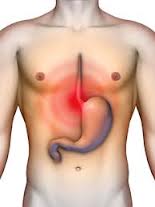If I asked you to trade me your heartburn symptoms for bone density loss, possible infection, and vitamin deficiencies, would you? Long-term use of acid reflux medications, known as proton pump inhibitors (PPIs), have dangerous side effects. To fully understand how PPIs create this domino effect of ill health, we have to look at the basic physiology of the digestive system. The entire digestive process is based on an acidic environment in the stomach and a stomach acid laden chunk of partially digested food entering the small intestine. A detailed explanation of proper digestion will be discussed at the end of this article.
Long-term use of heartburn medications creates a domino effect of ill health in the body
When heartburn medications are used, the enzyme pepsinogen secreted in the stomach is also inhibited because its ability to convert into its active form is limited. Proteins do not digest properly in the stomach. The stomach slurry released into the small intestine is not as acidic, which may affect the relationship of secretin, CCK, and lead to pancreatic enzymes being released in insufficient amounts. This can lead to improperly digested foods and larger food particles traveling through your guts. It leads to vitamin, mineral, and nutrient deficiencies.
What are the consequences?
Long-term reduction of stomach acid can increase the risk for:
- Infection from H. Pylori and other opportunistic bacteria. Long-term lack of acidity in the stomach may even increase your risk of developing a parasitic infection, since HCL can kill off some food borne parasites

Electron micrograph of H. pylori possessing multiple flagella (negative staining) (Photo credit: Wikipedia)
- Osteoporosis and osteoporosis related fractures
- Vitamin and mineral deficiencies, such as vitamin A, calcium, iron, vitamin B12, zinc, and folic acid deficiencies
- Protein and fat malabsorption, and increased indigestion
What are the Consequences of these Deficiencies? (please note this is not an exhaustive list)
- Vitamin A – suppression of the immune system, skin inflammation, gastric inflammation, lung inflammation, acid reflux, and infertility
- Protein Deficiency – immune suppression, anemia, inability to heal, blood sugar abnormalities, fatigue, and possible weight gain
- Calcium Deficiency – bone loss, hormone disruption, blood clotting problems, muscle cramping, high blood pressure, gum disease,
- Iron Deficiency – anemia, increased risk for viral and bacterial infections, fatigue
- Vitamin B12 – nerve damage, fatigue, increased risk for cancer, heart disease, bone loss, anemia, and depression
- Folate (Folic Acid) – risk of intestinal cancer and polyps, mood disorders (depression, anxiety), fatigue, risk of other cancers, heart disease, bone loss, and anemia
- Zinc Deficiency – reduced immune function, slow healing, easy bruising, lowered antioxidant status, acidic pH, diabetes, and heart disease
Why do some people suffer from acid reflux?
1) Too little stomach acid- AKA hypochlorhydria
Ironically, given the high use of heartburn medication that reduce stomach acid, one of the main causes of acid reflux is low stomach acid, called hypochlorhydria. When someone suffers from low stomach acid, a few things happen that can lead to acid reflux. Here is one example: stomach acid triggers the opening of the sphincter between the stomach and the small intestines. If there is not enough acid, the opening of the sphincter to the small intestine is delayed. This can lead to increased intrabdominal pressure and essentially create a small amount of backwash into the esophagus. There is still some acid present, so this will irritate the esophagus and cause the same amount of pain as acid reflux from a stomach with too much acid.
–> symptoms of hypochlorhydria include feeling like eating meat makes you nauseous, ill, uncomfortable, or a feeling of heaviness in your stomach when you eat meat, high protein foods, or greasy foods. It feels like these foods just sit there and keep on fermenting in your stomach. Belching, flatulence, and bloating shortly after eating are also signs of hypochlorhydria, especially if the belching includes a foul odor or taste.
2)Gluten and other food sensitivities often lead to acid reflux. Some recent research linked peptic disease, including heartburn, GERD, and stomach ulcers to gluten exposure in people with a gluten sensitivity and/or Celiac disease. Scand J Gastroenterol. 2009;44(12):1424-8.
3) Poor diet, especially one high in caffeine and alcohol consumption. Both caffeine and alcohol relax the sphincter between your esophagus and stomach, and can lead to acid backwashing into the esophagus.
4) Stress – especially paired with any of the above situations. Stress will often trigger our bodies to go into the nervous system called the ‘fight or flight’ response. The sympathetic nervous system is actually responsible for this response and when triggered by stress or perceived stressors, your body will actively shunt blood away from the digestive system to your skeletal muscles to take on that angry bear or boss or help you rush to your next meeting. Your body needs time and blood flow to drive digestion. If you find yourself in a high stress environment most of your days, then chances are, your digestive system is challenged leading to acid reflux that does not necessarily relate to excess stomach acid.
What to do if you have acid reflux/GERD/heartburn?
As an acupuncturist and East Asian Medicine practitioner, my biggest take away point is to treat the real underlying cause of any ailment, especially acid reflux. Taking heartburn medication in the above situations is not treating the real cause of the problem, and may do more harm than good. It is important to find out if you have too little stomach acid, or if your diet and lifestyle are the true root of the problem. I would encourage you to find a medical professional that looks into hypochlorhydria, diet, lifestyle, food sensitivities, and stress as causes of acid reflux. Most acupuncturists and East Asian Medicine Practitioners are trained in treating the digestive system, since the digestive system is seen as the center pillar of health in East Asian medicine. I encourage you to work with someone to counsel you through your acid reflux, since the Internet has much conflicting and sometimes poor information out there. It is also far easier to work with a trained health care professional than to make yourself crazy with self-diagnosis.
As Promised for those avid readers: ‘A Basic Outline of proper digestion’
Here is how your digestive system is designed to work. When you eat a meal or a snack, it goes into an acidic stomach environment. Protein digestion begins here. The chief cells and the parietal cells work in conjunction to begin the process of digesting proteins. The parietal cells are responsible for the acidic environment by creating HCL. The chief cells secrete pepsinogen into the stomach cavity, which is then converted by the acidic environment into its active form: the enzyme pepsin which begins the process of protein digestion. The acidic pH of your stomach also protects you from bacterial infections in the stomach itself. Your stomach churns the food around, the acid and pepsinogen helps to break it down into a slurry called chyme, that gets released into the small intestine. At this point, the acidity of the stomach contents triggers the small intestine to produce secretin and cholecystokinin (CCK). Secretin stimulates the pancreas to release a substance that neutralizes the stomach acid, and CCK stimulates the pancreas to release enzymes that will further digest the food in the small intestine. These enzymes further the digestion of carbohydrates, proteins, and fats.Your foods get broken down into small particles, amino acids, vitamins, minerals, small and large chain fatty acids and are absorbed into your blood stream through the walls of the small intestine in small, usable forms.



